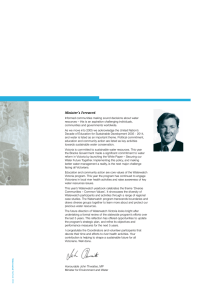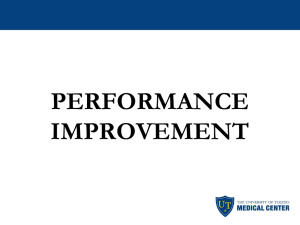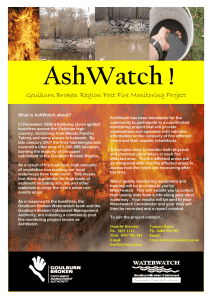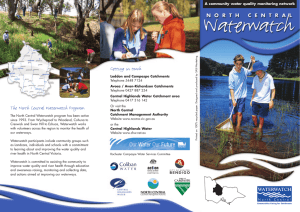Document 13168422
advertisement
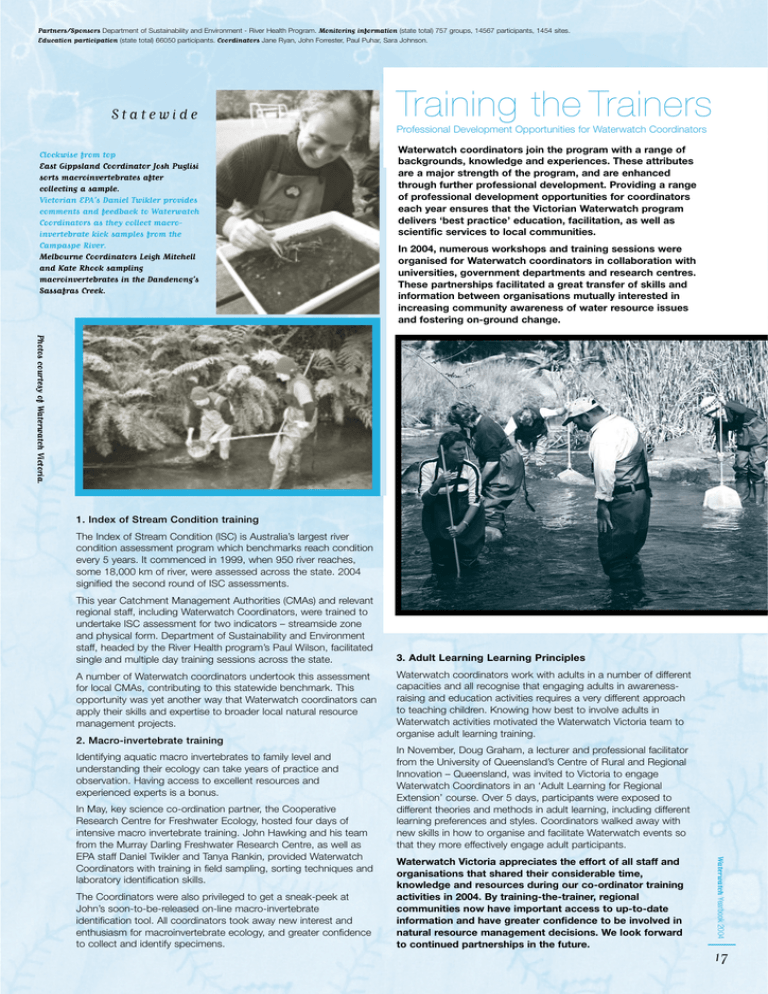
Partners/Sponsors Department of Sustainability and Environment - River Health Program. Monitoring information (state total) 757 groups, 14567 participants, 1454 sites. Education participation (state total) 66050 participants. Coordinators Jane Ryan, John Forrester, Paul Puhar, Sara Johnson. Statewide Training the Trainers Professional Development Opportunities for Waterwatch Coordinators Clockwise from top East Gippsland Coordinator Josh Puglisi sorts macroinvertebrates after collecting a sample. Victorian EPA’s Daniel Twikler provides comments and feedback to Waterwatch Coordinators as they collect macroinvertebrate kick samples from the Campaspe River. Melbourne Coordinators Leigh Mitchell and Kate Rhook sampling macroinvertebrates in the Dandenong’s Sassafras Creek. Waterwatch coordinators join the program with a range of backgrounds, knowledge and experiences. These attributes are a major strength of the program, and are enhanced through further professional development. Providing a range of professional development opportunities for coordinators each year ensures that the Victorian Waterwatch program delivers ‘best practice’ education, facilitation, as well as scientific services to local communities. In 2004, numerous workshops and training sessions were organised for Waterwatch coordinators in collaboration with universities, government departments and research centres. These partnerships facilitated a great transfer of skills and information between organisations mutually interested in increasing community awareness of water resource issues and fostering on-ground change. Photos courtesy of Waterwatch Victoria. 1. Index of Stream Condition training The Index of Stream Condition (ISC) is Australia’s largest river condition assessment program which benchmarks reach condition every 5 years. It commenced in 1999, when 950 river reaches, some 18,000 km of river, were assessed across the state. 2004 signified the second round of ISC assessments. This year Catchment Management Authorities (CMAs) and relevant regional staff, including Waterwatch Coordinators, were trained to undertake ISC assessment for two indicators – streamside zone and physical form. Department of Sustainability and Environment staff, headed by the River Health program’s Paul Wilson, facilitated single and multiple day training sessions across the state. A number of Waterwatch coordinators undertook this assessment for local CMAs, contributing to this statewide benchmark. This opportunity was yet another way that Waterwatch coordinators can apply their skills and expertise to broader local natural resource management projects. 2. Macro-invertebrate training Identifying aquatic macro invertebrates to family level and understanding their ecology can take years of practice and observation. Having access to excellent resources and experienced experts is a bonus. The Coordinators were also privileged to get a sneak-peek at John’s soon-to-be-released on-line macro-invertebrate identification tool. All coordinators took away new interest and enthusiasm for macroinvertebrate ecology, and greater confidence to collect and identify specimens. Waterwatch coordinators work with adults in a number of different capacities and all recognise that engaging adults in awarenessraising and education activities requires a very different approach to teaching children. Knowing how best to involve adults in Waterwatch activities motivated the Waterwatch Victoria team to organise adult learning training. In November, Doug Graham, a lecturer and professional facilitator from the University of Queensland’s Centre of Rural and Regional Innovation – Queensland, was invited to Victoria to engage Waterwatch Coordinators in an ‘Adult Learning for Regional Extension’ course. Over 5 days, participants were exposed to different theories and methods in adult learning, including different learning preferences and styles. Coordinators walked away with new skills in how to organise and facilitate Waterwatch events so that they more effectively engage adult participants. Waterwatch Victoria appreciates the effort of all staff and organisations that shared their considerable time, knowledge and resources during our co-ordinator training activities in 2004. By training-the-trainer, regional communities now have important access to up-to-date information and have greater confidence to be involved in natural resource management decisions. We look forward to continued partnerships in the future. Waterwatch Yearbook 2004 In May, key science co-ordination partner, the Cooperative Research Centre for Freshwater Ecology, hosted four days of intensive macro invertebrate training. John Hawking and his team from the Murray Darling Freshwater Research Centre, as well as EPA staff Daniel Twikler and Tanya Rankin, provided Waterwatch Coordinators with training in field sampling, sorting techniques and laboratory identification skills. 3. Adult Learning Learning Principles 17
